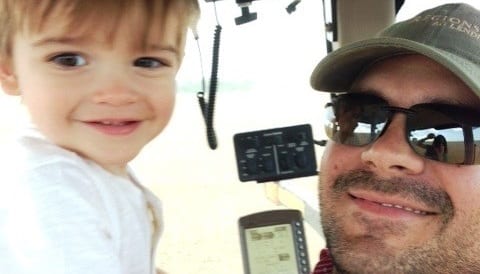D.I.D. Farms – Newport, Arkansas
Derek Haigwood, a soybean farmer in his early thirties, stands in his office on a chilly winter morning with a stack of files in front of him. After harvest and before planting season, the enormous task of sorting files, calculating taxes and planning for next year’s crop begins.
“Once we get all of the equipment washed and put away, we start going through the books and doing tax planning for the end of year,” Haigwood says. “There are strategic decisions to make regarding which crops to haul out of the grain bins, which crops to have delivered and which crops to take money on.”
After the freshly harvested soybeans have been assigned destinations and the taxes are in order, it’s time to plan for the next growing season. One of Derek’s decisions this winter involved cover crops.
“I’ve planted more cover crops this year than I ever have,” he says. “They keep the ground covered during the winter, which reduces erosion and weed pressure and builds organic matter for this year’s crop. Reducing erosion is the number one reason why I plant cover crops; this is my ground, and I don’t want it to be on someone else’s farm or in a waterway. I take all of the steps possible to keep my land on my farm.”
 Haigwood, right, monitors his on-farm crop storage with his brother Drew while cover crops enrich his fields.
Haigwood, right, monitors his on-farm crop storage with his brother Drew while cover crops enrich his fields.
Reducing erosion is just one of the ways Haigwood keeps his farm sustainable for not only this year, but for years to come. Other tactics he employs include:
- Laying down chicken litter on almost every acre to build organic matter.
- Blocking off drainage to hold water for water fowl.
- Using GPS systems on his equipment to reduce soil compaction.
- Managing water with a computer program to minimize water loss from his furrow-irrigation system. He also recycles the plastic irrigation pipe at the end of each year.
“Sustainability is always at the forefront of my mind,” Haigwood says. “My family depends on this ground year after year to make a living. I’m farming ground that my father and grandfather farmed. It is our most important asset.”
Haigwood works with his family to pool knowledge and make the best decisions for his farm.
“My dad and I farm separately, but together,” he explains. “My dad, my two uncles and my grandfather are the best resources I could ask for. They know how the land works, and they’ve made a lot of mistakes, and with this experience they’ve all become successful people. I would be a fool not to heed their advice.”
When asked what else he works on in the winter, Haigwood jokes, “If the sun’s shining bright, I work on going out there to shoot some mallards. Duck hunting is one of my favorite hobbies.”
 Haigwood and his brother Drew enjoy a successful duck hunt, due in part to his water-conservation efforts in the area.
Haigwood and his brother Drew enjoy a successful duck hunt, due in part to his water-conservation efforts in the area.
While preparations for this spring’s soybean crop are in a good place, Haigwood hopes to raise the bar even higher for the next generation.
“I’ve been doing this since I was a young boy,” he says. “I’ve been working with my father, grandfather, uncles and brother, and each year our farm is getting better. To say something is sustainable, that’s just making sure you can get a crop out of the land. Most farmers don’t want to just be sustainable—they want to be better. If my son decides to farm, I want him to have a better farm than I did.”
 Haigwood’s son, Judah, joins his father on the combine.
Haigwood’s son, Judah, joins his father on the combine.
